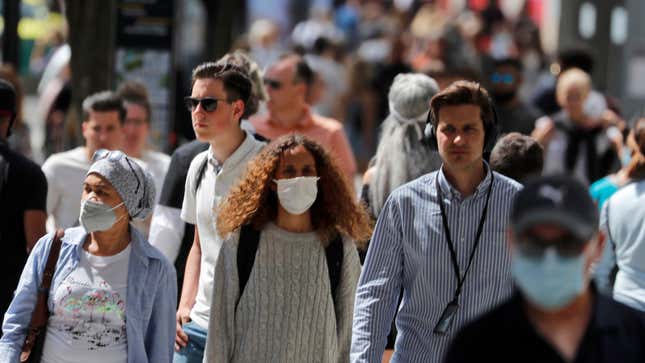
After five months of coronavirus lockdown, many of us get a little snappy when we see someone going about their business sans mask. But some sexual assault survivors say that wearing a mask triggers PTSD, and that everyone’s condescending attitudes aren’t helping.
Several such survivors have told the organization Rape Crisis that their concern about being confronted for not wearing a mask in public has led them to avoid going going out:
“A significant proportion of rape survivors had their mouths or noses covered, or were choked or smothered, as part of the abuse and violence they experienced,” Kate Russell, the national spokesperson for Rape Crisis England and Wales, told the Guardian. “Covering their face and nose now can trigger flashbacks, panic attacks and severe anxiety.” She added,
“There’s a lot of assumptions that people who aren’t wearing face masks are behaving that way because they’re selfish, stupid, careless or a combination of all three. This lack of awareness is creating legitimate anxiety among rape survivors that if they go out and about they might not be met with empathy and care.”
In the U.S., the CDC offers a short list of those who are exempt from wearing masks, including children under 2 years old, anyone with trouble breathing, and anyone unconscious, incapacitated, or otherwise unable to remove the mask themselves. It adds that those with “intellectual and developmental disabilities, mental health conditions or other sensory sensitivities” may have challenges wearing a mask, and advises those people to speak with their healthcare provider, as though that’s a realistic solution.
But in England, “severe distress” is recognized by the government as cause for legal exemption from face coverings. The country, like much of the rest of the world, is also doing much better job of containing the virus than the U.S., perhaps because only people who have genuine issues with masks abstain from wearing them, unlike...us.
Dr. Divya Jose, a psychiatrist in New York City, told ABC News that while there’s validity to the idea that masks may be triggering for those coping with trauma, such instances are probably rare:
“I could fathom rare cases of PTSD where past trauma involved a face covering; in such cases, wearing a mask may trigger potential flashbacks, but this is more an exception,” she said.
“I see lots of patients with mental health conditions including anxiety, psychotic and mood disorders, and I am yet to see one come in without a mask,” she added. “None of my patients have felt that wearing a mask triggers any of their symptoms.”
Even so, the Oxfordshire Sexual Abuse and Rape Crisis Centre has a list of ways to make wearing a mask more comfortable for abuse survivors, including practicing wearing them at home, or testing out different fabrics. You can see the full list here.